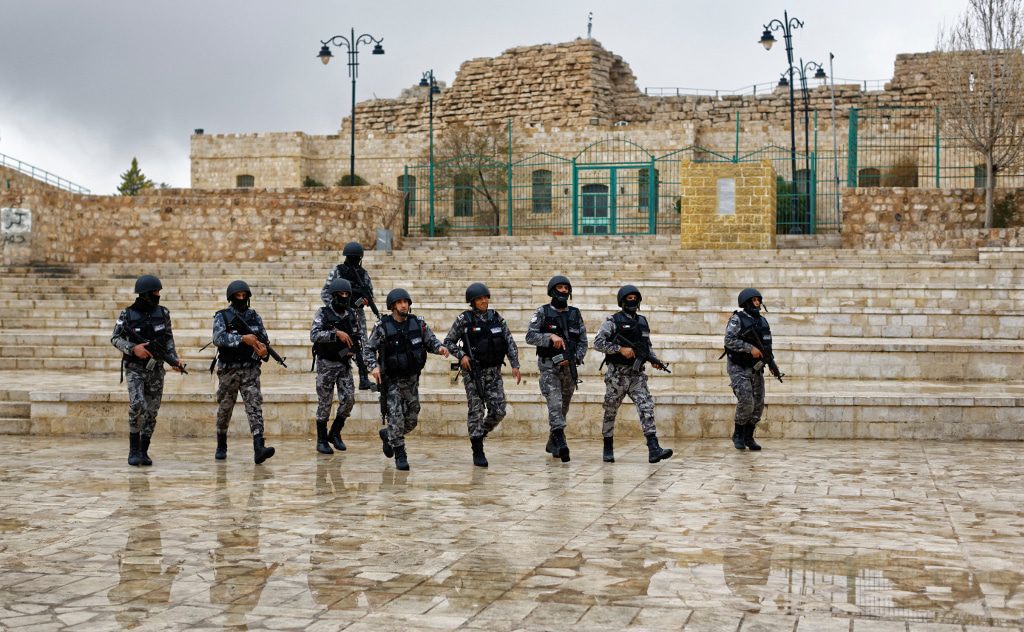
On 18 December 2016, armed men opened fire in al-Karak, a city 120km south of the Jordanian capital Amman. Up to ten people were killed, including security officers, a Canadian tourist and four of the attackers, and 34 others were wounded, according to Jordanian officials.
This was the latest in a series of incidents that have shaken Jordan over the past year. Although it was not immediately clear who was behind the shootings, they exposed Jordan’s vulnerability to internal terrorist threats as well as the possibility of sleeper cells that can become active without warning.
Jordan is a leading member of the United States-led coalition fighting the Islamic State (ISIS) in neighbouring Iraq and Syria. The Jordanian army has been tasked with protecting the kingdom from cross-border attacks and infiltration attempts.
Yet despite widening a crackdown on ISIS sympathizers at home, it has struggled to cope. On 21 June 2016, six Jordanian soldiers were killed and 14 were wounded after a car bomb exploded in al-Rukban, near the country’s border with Syria.
Another shooting ten days earlier, in Jordan’s largest refugee camp, killed five people. Authorities insisted that it was a lone-wolf attack, but there is evidence that, increasingly unable to mount centrally planned attacks, ISIS is relying on and coaching individuals to carry out attacks on its behalf.
Given the added difficulty of identifying lone wolves, who do not rely on an extensive network or financing structure, confronting terrorism will require Jordan to remain vigilant at all times, intensify its existing efforts and develop new approaches to counter violent extremism.
Following the attack, a number of senior security and military officials were replaced. Mahmoud Freihat took over from Mishal al-Zabin as chairman of the Joint Chiefs of Staff in October 2016. In a rare and unexpected interview with BBC Arabic on 30 December, Freihat spoke in some detail about the kingdom’s counterterrorism strategy and the threats facing the country, particularly ISIS. However, he predicted that 2017 would see the end of the extremist group, which he said had lost around 25 per cent of its fighters and large areas of territory.
In January 2017, Major General Ahmad Sarhan al-Faqih was appointed as director of the Public Security Department, replacing Atef Saudi. King Abdullah II, who approved the appointments by Royal Decree, sent letters to the two new officials. The letters suggest that one of the reasons why the recent attacks were not preempted was the lack of high-level coordination between the security services. He also highlighted the need to improve the living standards of security and military personnel, indicating that both groups will play important roles in any future strategies.
The reshuffle also extended to the government, with five new ministers brought in. The most notable change was the appointment of former police chief Ghaleb Zubi as interior minister. He replaces Salamah Hammad, who was dismissed after the parliament accused him of failing to perform his duty with regards to al-Karak.
Despite these replacements, the threats facing Jordan are not only security-related; rather, they have been fuelled by a combination of economic and social factors that may have political repercussions if left unaddressed.
Jordan is facing crippling economic problems, with successive leaders unwilling to carry out crucial but unpopular reforms. The government employs some 42 per cent of the country’s workforce, a figure that leaves little room for economic growth and innovation. According to recent World Bank statistics, youth unemployment stands at 28.8 per cent in a country where the median age is 22 years old. In addition, public debt has climbed to 90 per cent of gross domestic product.
Moreover, Jordan has absorbed around 630,000 Syrian refugees since 2011, according to the United Nations. Jordanian authorities put that number closer to 1 million, and say the costs associated with hosting these refugees is consuming a quarter of the country’s general budget.


